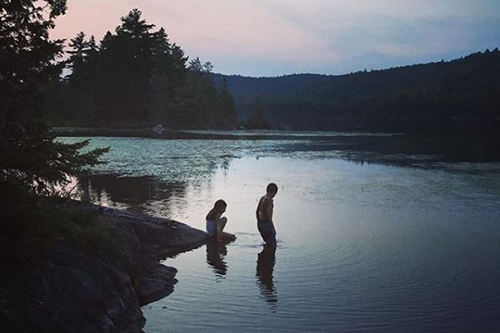| | M A Y 2 0 2 0 E D I T I O N | | | |  | Greetings Landmark Society Member, From the time I sent you an update in February to today, life has changed dramatically. We could have never guessed that a global pandemic would envelope our communities and disrupt our lives. I sincerely hope that you are well and that you feel supported at this time. During this pandemic, Mainers have flocked to wild places to take comfort in nature. The many local land trusts across the state have seen more visitors than ever before. This is exciting! Finding solace in the waterways and wilderness of Maine inspires people to protect them well into the future. You are someone who values Maine’s air, water, wildlife, and forests, and I hope that you, too, have found rejuvenation in nature this spring. | | | | | |  | Thirty Years Protecting the North Woods Cathy Johnson, NRCM’s director of our Forests & Wildlife program, recently retired. She returned (via video conference) to give an overview of her last 30 years of work. | | Read More | | | |  | 20th Anniversary of Maine’s Ecological Reserves Maine's Ecological Reserves encompass some of the most remote and ecologically important places in Maine, such as alpine peaks, old growth forests, and vast wetlands. | | Read More | | | | | CMP Corridor Proposal We are at the forefront of stopping the Central Maine Power (CMP) proposal to build a 145-mile transmission line through Maine to bring hydropower from Canada to customers in Massachusetts. | | Read More | | | From all of us at NRCM, thank you for enabling the nature of Maine to thrive this spring—and in every season. In a changed world, our air, water, wildlife, and forests are constants. And, they are a reminder—more so than ever—of the importance of protecting our natural resources. On behalf of the staff, board, and the nature of Maine thank you for all that you do, Lisa Pohlmann, CEO | | | | | | | | Thirty Years Protecting the North Woods. Reflecting on the last 30 years of the Forests & Wildlife program was an opportunity to fall in love all over again with all that NRCM has done and continues to do for the nature of Maine. In a practical sense, protection of the North Woods and all of the forests in Maine involves land protection, land use regulation, and forestry monitoring. The Forests & Wildlife team examines every proposed rule change in the North Woods from the Land Use Planning Commission, Maine Forest Service, and Bureau of Parks and Land. They also review every Land Use Planning Commission application and management plan for all 600,000 acres of the Public Reserved Lands and state parks. They are heavily involved with dozens of bills each legislative session that have to do with Maine’s forests. Cathy pointed out that policy work is messy and hard. But, for those of us who cherish the nature of Maine, it makes a world of difference. And, I want you to know that you are at the heart of this work. You, and all NRCM members, are the champions who make it happen. Thirty years ago, 1% or one million acres of land was protected in Maine. Today, almost four million acres of land in Maine is permanently protected. This ranges from conservation land that restricts development but allows timber harvesting to Ecological Reserve systems that are far more restrictive. Maine’s North Woods is the largest remaining unfragmented block of temperate forest in the world. It is critically important that we protect this ecologically important region of the world. Thank you for making it possible to do so. | | | | | | | | Cathy shared a photo of primary roads in the eastern United States. The big empty area in our North Woods is a clear visual of why we need to protect this area for all species—and particularly the species that depend upon large tracts of contiguous land for their survival. During Cathy’s tenure at NRCM, there were many battles fought to protect Maine’s forests. Some were lost, but many were won. One thing is certain, the nature of Maine would look very different today without NRCM’s advocacy work. And, I can’t say enough about how central you are to these accomplishments. | | | | | | Twentieth Anniversary of Maine’s Ecological Reserves. In 2000, the Maine Legislature designated Maine’s Ecological Reserves on Maine’s Public Reserved Lands. These areas prohibit timber harvesting and other significant interference by humans. There are currently 90,000 acres of this land throughout Maine where trees are left to grow large and downed wood is left to be used for habitat. These areas for hands-off management allow flora and fauna to flourish without interruption. The purpose of the Ecological Reserves is to conserve the biodiversity in each of the state’s 15 different biophysical regions and serve as benchmarks for long-term research. Significant progress has been made over the last twenty years while there is work left to do to finish the Ecological Reserve system. | | | | | | CMP Corridor Proposal. There will always be critical work left to do to protect our treasured forests from inappropriately sited development pressures. If the CMP line proposal passes, it would have a large impact on the undeveloped character of the North Woods. Despite CMP’s marketing claims, the transmission corridor would result in no real reduction in global carbon pollution while inflicting irreparable harm on Maine’s North Woods and local communities. This project is a bad deal for Maine. | | | | | | Maine’s Department of Environmental Protection issued a permit for the project; however, this is far from a done deal. The Army Corps of Engineers still needs to issue a permit. And, Maine voters will have the opportunity to overturn the permit issued by the Public Utilities Commission on the November ballot. On behalf of the nature of Maine, you can be assured that we will oppose this transmission line proposal at every step by providing sound research, expert testimony, and elevating the voices of people all across Maine. Your partnership allows us to continue this critical work in the weeks and months ahead. The risks to Maine's treasured western mountains from CMP's plan are clear. This massive transmission line provides no climate benefits and must be stopped. | | | | 3 Wade Street
Augusta, Maine 04330
1-800-287-2345
nrcm@nrcm.org | | | | | | | | | | | |